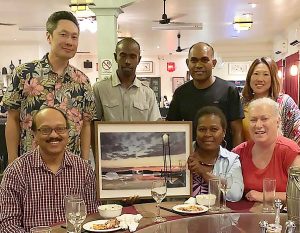
Back: Professor Desmond Yip, Dr Andrew Soma, Stephen Kole RN, pharmacist Beth Hua Front: Dr Nali Pati, Meltus Oiapata RN, Wendy Spencer RN
Australian expertise has helped deliver an oncology unit in the Solomon Islands where patients are now benefiting from safe administration of simple chemotherapies and losing their previous nihilism to a cancer diagnosis.
Medical oncologist Professor Desmond Yip has led the capability and capacity building project from an early 2016 scoping visit to the National Referral Hospital in Honiara.
The project, described in an article in JCO Global Oncology [link here], has included in-country training for Solomon Islands health professionals, medical and nursing clinical observerships in Australia, as well as the development of guidelines and the physical infrastructure for the unit.
The Australian team comprised Professor Yip, from the Canberra Hospital and the ANU, clinical haematologist Dr Nalini Pati, clinical nurse consultant Wendy Spencer and pharmacist Beth Hua.
Professor Yip told the limbic that low income countries like the Solomon Islands still rely on the simple chemotherapies that he learned to use when he trained in the late 80s / early 90s.
“And I thought it was just a matter of helping the local health professionals give these drugs in a safe manner… resource-limited countries can still help a lot of people in terms of being able to cure certain types of cancers or improve the survival of cancers like breast cancer and colon cancer.”
“So the satisfaction is that these doctors asked for help, and we were able to help them deliver what they wanted. They were very receptive to recommendations and have been able to follow through with a lot of those. They’ve now got a sustainable unit that can deliver health care in their resource constrained setting.”
He said some nurses, especially those of childbearing age, had been worried about exposure to cytotoxic drugs and didn’t want to work in oncology before the training.
“But if you do it in a safe manner, like using the chemotherapy compounding isolator and wearing proper PPE, the risks are fairly low.”
Dr Andrew Soma, the Solomon Island’s oncology registrar, told the limbic that the local oncology team had grown from one doctor and two nurses to two doctors and five nurses.
The unit’s case load has grown from 39 cases and 321 chemotherapy sessions in 2019 to 99 cases and 743 chemotherapy sessions in 2022. Development of the unit has also centralised cancer treatments rather than being delivered in the previously ad hoc manner by different teams.
“We have benefited a lot from the program. We are able to treat cancers that we were not able to treat before and we follow them up closely….not like before,” he said.
“We just need to expand a bit more because the room now doesn’t fit the day chemotherapy patients. We only have four chemo chairs so we can only see four at a time.”
Dr Soma, who did his medical training in Papua New Guinea, said the clinical observerships in Australia had been particularly valuable.
“I had never seen a cancer unit before. Now I realise that sometimes these cancers are treatable.”
Dr Yip, who also chairs the COSA Global Oncology Group, said the project was to build capability and capacity within the local health teams rather than encouraging dependence on ‘fly-in” foreign teams delivering services alone.
He said there was a lot of need in the region including from Papua New Guinea, which was commissioning a cancer centre with radiation oncology facilities, and in Timor-Leste.
However there was also a lot of welcome activity in the region from organisations including the International Society of Paediatric Oncology, Doctors Assisting in South-Pacific Islands (DAISI), and the Australian Government which is currently inviting proposals for new health partnerships in the Pacific and southeast Asia [link here].